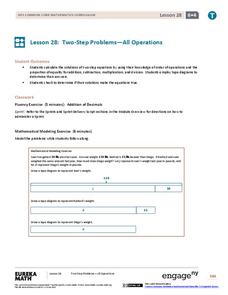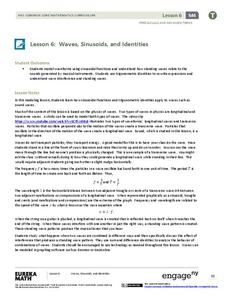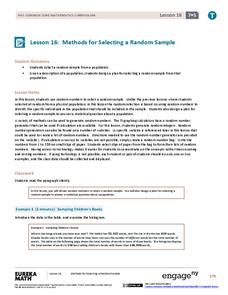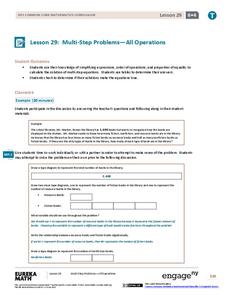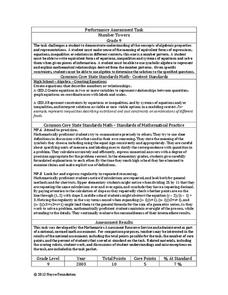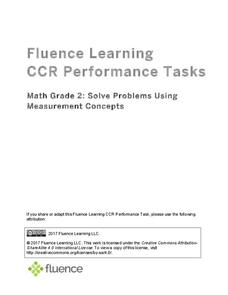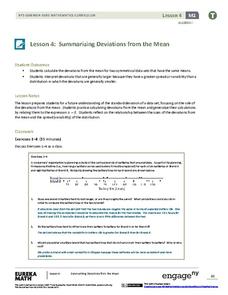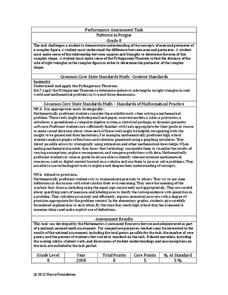Fluence Learning
Writing an Argument: Persuasive Speeches to Students
Powerful orators make their messages compelling with a combination of factors. Learn how to be an inspirational speaker with a reading assessment activity that presents a list of persuasive speaking techniques, as well as two...
EngageNY
Two-Step Problems—All Operations
Step 1: Use the resource. Step 2: Watch your class become experts in solving two-step problems. Scholars learn to solve two-step word problems in context. They use tape diagrams and algebraic techniques to break the problem into two,...
Fluence Learning
Construct Viable Arguments About Adding Fractions
Test mathematicians' knowledge of adding fractions with a brief assessment that challenges them to play teacher while correcting a peer's work. Scholars examine Carl's mathematical response, identify where he went wrong,...
College Board
1999 AP® English Literature and Composition Free-Response Questions
Have you ever felt like you are pulled into two directions? Some authors depict this feeling in their characters. Scholars choose a play or novel in which a character is pulled or influenced by two different directions and write essays...
EngageNY
Waves, Sinusoids, and Identities
What is the net effect when two waves interfere with each other? The lesson plan answers this question by helping the class visualize waves through graphing. Pupils graph individual waves and determine the effect of the interference...
EngageNY
Methods for Selecting a Random Sample
Random sampling is as easy as choosing numbers. Teams use random numbers to create a sample of book lengths from a population of 150 books. The groups continue by developing a technique to create samples to compare from two populations...
Illustrative Mathematics
Listing Fractions in Increasing Size
Increase the depth of your class's fractional number sense with this number-ordering activity. Given four fractions, each with different numerators and denominators, young learners are asked to place them in order from smallest to...
CCSS Math Activities
Smarter Balanced Sample Items: 6th Grade Math – Claim 2
They claim there are problems on the assessment. The presentation provides 13 questions that demonstrate the problem-solving claim for Smarter Balanced assessments. Teachers use the resource to provide examples of problem-solving...
Illustrative Mathematics
A Midpoint Miracle
Young geometers develop one of the fundamental properties of quadrilaterals (connecting side midpoints gives a parallelogram) in this short but thought-provoking exercise. Using a combination of hands-on techniques and abstract algebraic...
EngageNY
Selecting a Sample
So what exactly is a random sample? The 15th part in a series of 25 introduces the class to the idea of selecting samples. The teacher leads a discussion about the idea of convenient samples and random samples. Pupils use a random...
EngageNY
Multi-Step Problems—All Operations
Harness the power of algebra to solve problems. Young mathematicians learn to work out multi-step problems by applying algebraic techniques, such as solving equations and proportions. They use tape diagrams to model the problem to finish...
EngageNY
Measuring Variability for Symmetrical Distributions
How do we measure the deviation of data points from the mean? An enriching activity walks your class through the steps to calculate the standard deviation. Guiding questions connect the steps to the context, so the process...
Inside Mathematics
Number Towers
Number towers use addition or multiplication to ensure each level is equal. While this is common in factoring, it is often not used with algebraic equations. Solving these six questions relies on problem solving skills and being able to...
Fluence Learning
Solve Problems Using Measurement Concepts
Young mathematicians demonstrate what they know about measurement with a four-task assessment that focuses on estimation, length, and inches.
Illustrative Mathematics
Similar Circles
Young geometers flex their transformation muscles in this brief but powerful exercise using dilations and translations to develop the similarity of circles. The plan provides guidelines to help learners navigate a pair of...
Illustrative Mathematics
Kimi and Jordan
Kimi and Jordan have taken summer jobs to supplement their weekly allowances. Kimi earns more per hour than Jordan, but Jordan's weekly allowance is greater. This activity asks students to determine how the incomes of the two workers...
Curated OER
Making a Ten
An addition table supports third graders as they learn strategies to improve their math fluency. When finding sums greater than ten, students are taught how to first make a ten and then add on the rest. A similar method is also...
EngageNY
Writing and Evaluating Expressions—Exponents
Bring your young mathematicians into the fold. Scholars conduct an activity folding paper to see the relationship between the number of folds and the number of resulting layers in the 23rd installment of a 36-part module. The results of...
EngageNY
Summarizing Deviations from the Mean
Through a series of problems, learners determine the variability of a data set by looking at the deviations from the mean. Estimating means of larger data sets presented in histograms and providing a way to calculate an...
Illustrative Mathematics
Is This a Parallelogram?
If both pairs of opposite sides of a quadrilateral are congruent, is the quadrilateral a parallelogram? This task asks learners to determine the answer and to support their answer with a proof. The resource includes a commentary for...
Mathematics Assessment Project
A Day Out
An applicable task presents a problem for pupils to solve: where to go for a class field trip. The pupils must take into consideration the first and second choices of members of the class when determining where to go. Individuals also...
Inside Mathematics
Coffee
There are many ways to correlate coffee to life, but in this case a worksheet looks at the price of two different sizes of coffee. It requires interpreting a graph with two unknown variables, in this case the price, and solving for...
Student Handouts
Bubble Answer Sheet
Need a quick way to administer and grade a multiple choice quiz? Keep this bubble sheet as a staple of your curriculum toolkit! It can be used for assessments with up to 30 multiple choice or true/false questions.
Inside Mathematics
Patterns in Prague
Designers in Prague are not diagonally challenged. The mini-assessment provides a complex pattern made from blocks. Individuals use the pattern to find the area and perimeter of the design. To find the perimeter, they use the Pythagorean...

